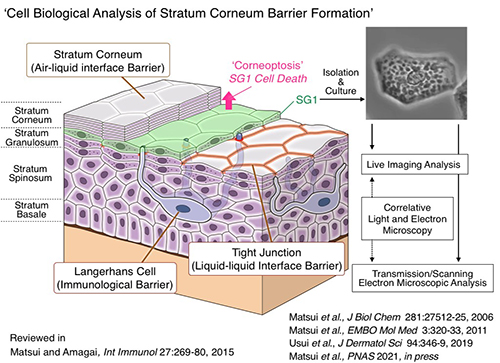Takeshi MATSUI
| Name | Takeshi MATSUI |
| Department/Research Field | Dermatology, Evolutionary cell biology |

| Research content |
| Around 360 million years ago, the first terrestrial vertebrates, amphibians, emerged from the water and adapted to life on land. They evolved their surface multilayered epithelia into keratinized stratified squamous epithelia (epidermis) to prevent water loss and protect the body from sunlight. With a particular emphasis on this epithelium, we aim to uncover the mystery of 'epithelial evolution.' The epidermis is composed of keratinized stratified squamous epithelia and consists of the stratum basale, stratum spinosum, stratum granulosum (SG), and stratum corneum (SC). Our group has been focusing on the cell death mechanism of the uppermost stratum granulosum cells (SG1) to clarify how the SC barrier is formed. We recently demonstrated that, through intravital imaging of mouse skin, SG1 cell death begins with an irreversible, sustained intracellular Ca2+ elevation, followed by rapid acidification. These findings provide an important framework for understanding the unique cell death pathway in keratinocytes, referred to as 'corneoptosis.' We are currently working on correlative light and electron microscopic (CLEM) analysis of corneoptosis in amphibians, reptiles, aves and mammals. Comparative evolutionary cell biology of corneoptosis could enable us to dissect the mechanism of the adaptive evolution of skin. |
 |
| Research theme |
1. Comparative evolutionary cell biology of SG1 cells. |
| Research keywords |
| skin barrier , keratinocyte , cornification |
| Lab link |
https://takeshi-matsui-lab.bs.teu.ac.jp/?page_id=311&lang=ja |

